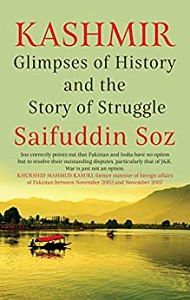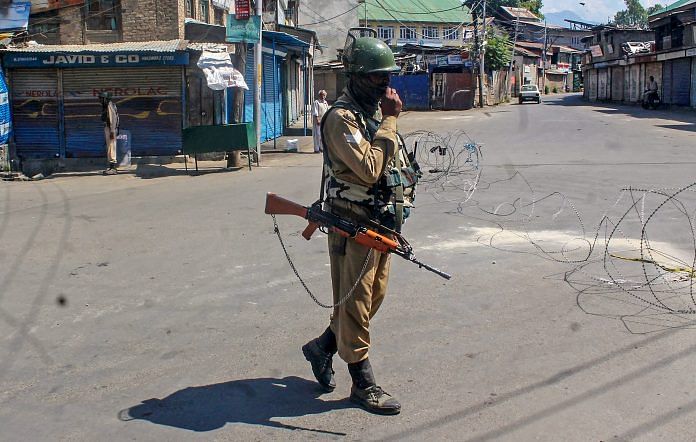Keeping the present scenario in view, I have conceptualized an outline on what is the way forward to reach a settlement on this dispute. My quest for a possible solution has led me to suggest the following.
1.In my opinion, the primary responsibility goes to the Government of India, which must take steps to help the people of Kashmir to move out of the tormenting cycle of violence. The initial steps could be to show a gesture of compassion for creating a situation of relief in the minds of Kashmiris, who have suffered immense miseries from the very day the central government started dragging its feet from its commitments to willingly accept the decisions of the Jammu & Kashmir Constituent Assembly and the provisions of autonomy guaranteed under the Delhi Agreement of 1952.
Apart from the commitments of the Indian government at various points of time, the clear commitment made by the then prime minister of India, P.V. Narasimha Rao should serve as a guiding principle to take measures to resolve the dispute. When the crisis caused by the armed militancy in Kashmir had touched its peak in 1995, Prime Minister Narasimha Rao had felt the compulsion of making a decisive statement on Kashmir while he was on a tour abroad in Burkina Faso, Africa. He made a categorical commitment in the following statement: ‘From a long distance away from home, I am addressing an appeal through this statement to the people of Jammu and Kashmir, at a time which could well turn their destiny once again in glorious manner, so as to make that lovely land a peer to paradise— jannatnishaan, as it has been called for centuries.’ The statement further clarified that it would be a situation ‘short of azadi and sky was the limit for it’.
Keeping the situation explained herein-above, the first step in this direction could be to initiate a dialogue with the primary stakeholder, the people of Kashmir. And, if the Union of India has to talk to the people of Kashmir, it will have to decide the grouping with which it will initiate the dialogue. In my opinion, it is the political conglomerate called the Hurriyat. Then, the ball will certainly move to what is broadly known as the ‘mainstream’. Under the present circumstances, it is possible that ultimately the Hurriyat and the mainstream might have to move to a broader political consensus on an ‘achievable goal’.
2.The Government of India should have realized much earlier that it was wrong for it to dilute the autonomy that was enshrined in Article 370 of the Constitution of India and the Delhi Agreement of 1952 between Nehru and the Sheikh. History offers lessons and anybody who does not learn from mistakes is bound to repeat them. The Union of India suffered for its short-sightedness. Nehru had realized that India’s policy had gone wrong in Kashmir and it was the greatest blunder committed by the Government of India to have dismissed and arrested the Sheikh unconstitutionally. Nehru had regretted the action, but the Union of India itself hadn’t learnt the lesson as it repeated its mistake by incorporating a clause in the Indira-Abdullah Accord of 1975 aimed at examining all the central laws promulgated in Jammu & Kashmir since 1953, but never showed its nerve to implement the same. The Centre committed mistakes subsequently also by taking recourse to issuing orders unlawfully like the presidential order of 1954. It repeated another blunder by dismissing the Farooq Abdullah government unconstitutionally on 2 July 1984.
It committed yet another grave mistake by appointing Jagmohan Malhotra as the governor of Jammu & Kashmir for the second time on 19 January 1990, against the protest by the Farooq Abdullah government. It is widely believed that Jagmohan was squarely held responsible by the people of Kashmir for creating a chaotic situation of death and destruction in the state and also organizing the exodus of Kashmiri Pandits. So, it is the Union of India that caused unrest in the minds of the people of Kashmir and deepened it over a period of time by committing mistakes one after the other. The Union of India has to adopt a mechanism to assess properly as to what has gone wrong and how it can be corrected.
3.The Government of India should implement a policy shift in Kashmir. The basic tenet of that would be the realization that no amount of repression in Kashmir, be it through bullets or pellets, can solve the problem. The anger in the minds of the people of Kashmir, particularly in the minds of the youth, has to be addressed. The policy shift will also envisage that the army, the paramilitary forces and the Jammu & Kashmir Police have to design a policy to win back people for a dignified and peaceful normal life. I am convinced that the vast majority in India feels that Kashmir can’t be treated as a law and order problem. If that is so, then, let me say what the present-day military leadership should do in the days to come.
The leadership of the army should realize that instead of providing more supplies of arms to control the mobs, it would be better to reach out to the people of Kashmir and address the unrest there. General (retd) D.S. Hooda had, perhaps, this very situation on his mind when he suggested in his article ‘In Valley, No Magic Bullet’143 that there was a need to kill terrorism in Kashmir rather than terrorists. He had also cautioned that along with the tangibles like number of violent incidents, soldiers killed, terrorists killed there was a need to pay attention to equally important non-tangibles. His article explained the fact that it was of utmost importance to reach the minds of the youth through a path away from bullets and pellets.
 Excerpted with permission from Rupa Publications India
Excerpted with permission from Rupa Publications India



